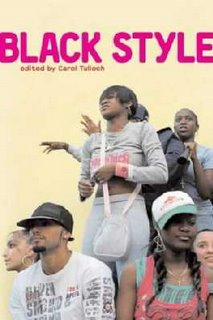
Black Style
Carol Tulloch
Book Description
The highly distinctive styles adopted by black men and women over the last fifty years have their origins in the African diaspora, but they have also been molded by politics, cultural exchange and the desire of different social groups to forge a distinctive identity. Black Style looks at the huge variety to be seen in black dress, hair and accessories, whether in West Africa, Jamaica, or reinvented on the streets of the United States and Great Britain.
John Picton looks at West Africa and the relationship between the vibrant textile patterns dyed and woven by local tribespeople and the statuesque robes worn by West African communities while Carolyn Cooper concentrates on Jamaican dress and its historical roots. Susan B. Kaiser, Leslie Rabine, Carol Hall and Daryl Ketchum highlight hip-hop culture within a broader historical context, placing the concept of respect, originating in the early years of slavery, at the centre of the African-American style identity. Carol Tulloch draws on a wide range of examples, from the Evangelical church and gospel singers to family events such as weddings and funerals, the world of pop music, carnival and street markets, to portray the multiple strands that make up black dress and identity in Great Britain.
Generously illustrated, this book portrays the wonderful diversity of approaches to fashion and individual style within the black community, while also giving voice to black men and women and engaging with current debates on the significance of dress in political and socio-cultural terms.
Key features:
- Accompanies Black British Style exhibition at the V&A
- International in scope
- Documents real people in real situations
- Authors draw on personal experience as well as placing black style in the wider context of contemporary culture
Synopsis
John Picton looks at West Africa and the relationship between the vibrant textile patterns dyed and woven by local tribespeople and the statuesque robes worn by West African communities, while Carolyn Cooper concentrates on Jamaican dress and its historical roots. Susan B. Kaiser, Leslie Rabine, Carol Hall and Daryl Ketchum highlight hip-hop culture within a broader historical context, placing the concept of respect, originating in the early years of slavery, at the centre of African-American style identity. Carol Tulloch draws on a wide range of examples, from the Evangelical church and gospel singers, to family events such as weddings and funerals, the world of pop music, carnival and street markets, to portray the multiple strands that make up black dress and identity in Great Britain. Generously illustrated, this book portrays the wonderful diversity of approaches to fashion and individual style within the black community, while also giving voice to black men and women and engaging with current debates on the significance of dress in political and socio-cultural terms.
No comments:
Post a Comment